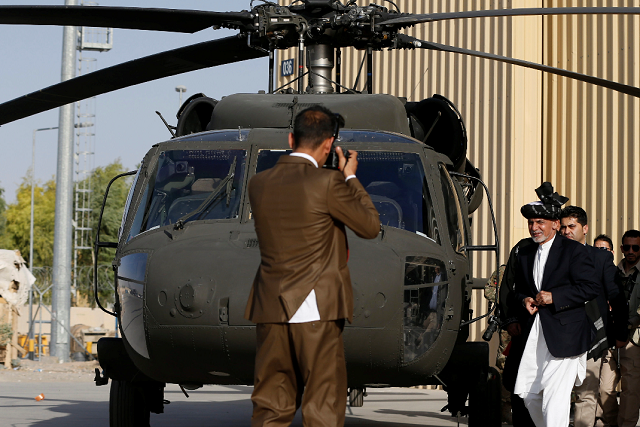New US helicopters mark major change for Afghan air force
By 2024 the US plans to provide the Afghans with at least 159 Black Hawks

Afghan President Ashraf Ghani inspects a Blackhawk helicopter. PHOTO: REUTERS
While the plan for new UH-60 Black Hawk helicopters has been in the works for some time, it forms a major part of the US-led military coalition's training efforts, which were expanded under proposals approved by President Donald Trump in August.
"It's a modernization of their program that will allow them to project power throughout Afghanistan," said Lieutenant Colonel Trent Alexander, a US military adviser to the Afghan air force.
Afghan security forces killed in 'friendly fire' incident
"While transitioning to the Black Hawk will not be a quick task, it will not be a difficult task." At a ceremony at Kandahar Airfield in southern Afghanistan, Afghan President Ashraf Ghani formally accepted the first new helicopters, calling it a "historic day" that would allow the air force to better respond to the demands on the security forces.
The Russian-designed Mi-17 helicopters that currently form the backbone of the Afghan air force worked well for crews used to Russian equipment, but deteriorating relations between Moscow and Washington meant that the Americans were unable to provide new parts and aircraft to replace the overworked aircraft.
"The Mi-17 was a great aircraft and it brought the Afghans the ability to be capable, however, with the introduction of the UH-60 they are now sustainable," Alexander said.
Poverty forces child soldiers into endlessly replenishing Afghan Taliban ranks
Taliban reaction
By 2024 the US plans to provide the Afghans with at least 159 Black Hawks, including 58 fitted with extra rocket pods and machine guns to provide close air support, a fleet that will dwarf the fewer than 40 Mi-17s currently operational.
The Black Hawks will cost the American government almost $8 million a piece, officials said, after a process that completely refurbishes and upgrades US Army surplus aircraft.
So far only two training Black Hawks have arrived, with the delivery of several additional helicopters delayed by the US military's humanitarian response to hurricanes in the Caribbean.
Three-day moot: Envoys conference on Trump's Afghan strategy kicks off
Retraining an Afghan pilot to fly the Black Hawk takes about five to six months, said Alexander. Members of the first class of six pilots said they were excited over what they view as more modern helicopters.
"Black Hawks are manoeuverable because they are smaller than the Mi-17, so will be more capable during fighting, carrying soldiers, or cargo," said one pilot, Zabihullah Dorandish.
The Afghan pilots are expected to begin flying their own missions in the Black Hawks by early next year, officials said. A Twitter feed attributed to Taliban spokesperson Zabihullah Mujahid warned that the aircraft would do nothing to change the war.
US and Afghan leaders "should remember that our fight is not based on technology but is an ideologically motivated
fight," he said.



















COMMENTS
Comments are moderated and generally will be posted if they are on-topic and not abusive.
For more information, please see our Comments FAQ